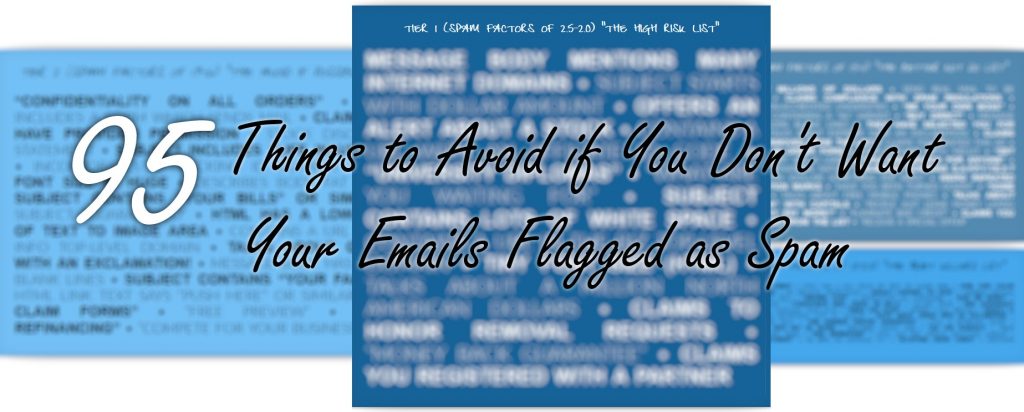We have all received spam at one point in our life – most of us receive it every day. Generated by bots and sent in bulk, spam and phishing email is actually not all that creative. Yes, it constantly adapts and changes in an attempt to outsmart email users, ISPs and ESPs to bypass their spam alarm, but not very fast (at least not fast enough to elude our very own phish-i-nator).
This being said, patterns emerge and, here at Mailjet, we take time to systematically gather and analyze those patterns. Over the past few years, we’ve seen ISPs get smarter and move away from more traditional spam alarms. Nowadays, the focus is on user engagement, both positive and negative. ISPs learn from how we interact with the messages that arrive in our inbox, which helps them determine whether emails should go to the Spam folder or land safely in our inbox.
Words that trigger the Spam Alarm
So what does this have to do with the language used in your subject lines, then? Well, spammy words tend to be misleading, thus resulting in higher-than-normal user complaint rates. These complains, along with poor interaction from recipients have a negative effect on the sender reputation and, ultimately, impact the deliverability of future messages.
Just imagine how many times you have received a subject line that includes the word “Free”. How many times has there actually been something that’s truly free in the email? Probably very few, which explains why now, when you read the word “Free” in your inbox, you generally just roll your eyes at a not-so-subtle attempt to get you to open a deceiving email.
And if people do open the email and then find that there’s actually nothing really free there, senders can expect a high rate of user complaints that will impact their future inbox placement.
So if you are looking to avoid those words that will trigger your recipients and ISPs spam alarms, we’ve got you covered. We’ll be sharing some of the most common spammer lingo we’ve seen to help you protect yourself but to also help you avoid being mistaken for a spammer, or worse, a phisher.
Invoice
The word “invoice” is a phisher’s favorite – if you see this word in a subject line, there’s a chance they’re trying to bait you in. Make sure to check the sender address to verify the email’s validity. billing@ex-ample.com is not the same as billing@example.com. Scammers try to profit out of our carelessness.
PayPal, Visa/MasterCard or any bank name
Again a case where a legitimate name can be used for phishing. Scammers often try to impersonate financial institutions by sending emails with the same color scheme and layout, redirecting to a mirrored site made to look almost exactly like the one it is spoofing. As a consumer, follow the same steps above, verifying the sender address and domain name. As a marketer, use authentication tools DKIM and SPF to prevent spoofers from hurting your reputation.
Present/Lottery/Gift/Specially for you
This is one you always see in your inbox – the “dear friend” scheme. Hundreds of thousands of emails are sent to people with a subject line claiming that you’ve won a big prize or that you’ve been selected for a sweepstakes you’ve never entered before. You have to be very gullible to fall for that one, yet scammers still send these by the millions since they are quick and easy to send.
Urgent/Desperate/Please Help
Variations of this “damsel in distress” scheme have made appearances over the years, where phishers pretend to be an affluent person from a far away country, who, being chased by wrongdoers, is forced to flee to a save haven. For some reason they have chosen you as the sole trustee of all their money and they promise great rewards for helping them open an account with a specific bank so that they can transfer their funds. To be honest, if I had a dollar for every African princess/prince and long lost lover that have spammed me, I would indeed have reaped great rewards by now!
Casino/Free Spins/Deposit Bonus
Gambling spammers often send out campaigns that promise high return, free entry or double deposits. If it’s not a website you recognize, then straight to the spam folder it goes.
Here are some examples of specific words you want to be cautious of using (you can click on the image to make it larger):
Data quality, selective targeting and a proper sending cadence are the main keys to strong deliverability. So unless you’re sending something highly inappropriate or terrible, words alone won’t necessarily damage your sender reputation.
If you’re targeting the right people with engaging content at the right frequency, you should have no problem hitting the inbox. If your recipients trust your brand and are always excited to read your emails, you could probably use just about every spammy word on our list and still hit the inbox, because your contacts will still interact with them and all of your user engagement metrics will look great.
What are some other words you typically avoid using in your subject line? Or misleading subject lines you see used by spammers? Share them with us on Twitter.
This blog post is an updated version of the post “Words That Will Trip The Spam Alarm“, published on the Mailjet blog on December 4th, 2014 by Rad Penchev.

